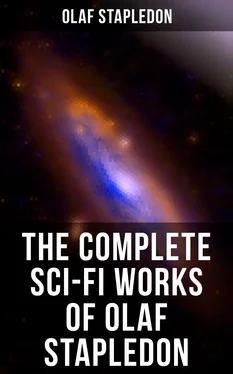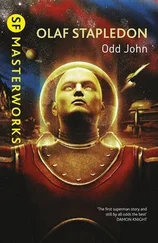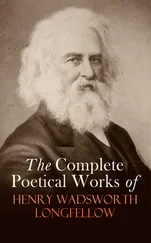Certain strange vestiges of human mentality did indeed persist here and there, even as, in the fore-limbs of most species, there still remained buried the relics of man’s once cunning fingers. For instance, there were certain grazers which in times of hardship would meet together and give tongue in cacophonous ululation; or, sitting on their haunches with fore-limbs pressed together, they would listen by the hour to the howls of some leader, responding intermittently with groans and whimpers, and working themselves at last into foaming madness. And there were carnivora which, in the midst of the spring-time fervour, would suddenly cease from love-making, fighting, and the daily routine of hunting, to sit alone in some high place day after day, night after night, watching, waiting; until at last hunger forced them into action.
Now in the fullness of time, about three hundred million terrestrial years after the solar collision, a certain minute, hairless, rabbit-like creature, scampering on the polar grasslands, found itself greatly persecuted by a swift hound from the south. The subhuman rabbit was relatively unspecialized, and had no effective means of defence or flight. It was almost exterminated. A few individuals, however, saved themselves by taking to the dense and thick-trunked scrub, whither the hound could not follow them. Here they had to change their diet and manner of life, deserting grass for roots, berries, and even worms and beetles. Their fore-limbs were now increasingly used for digging and climbing, and eventually for weaving nests of stick and straw. In this species the fingers had never grown together. Internally the fore-paw was like a minute clenched fist from the elongated and exposed knuckles of which separate toes protruded. And now the knuckles elongated themselves still further, becoming in time a new set of fingers. Within the palm of the new little monkey-hand there still remained traces of man’s ancient fingers, bent in upon themselves.
As of old, manipulation gave rise to clearer percipience. And this, in conjunction with the necessity of frequent experiments in diet, hunting, and defence, produced at length a real versatility of behaviour and suppleness of mind. The rabbit throve, adopted an almost upright gait, continued to increase in stature and in brain. Yet, just as the new hand was not merely a resurrection of the old hand, so the new regions of the brain were no mere revival of the atrophied human cerebrum, but a new organ, which overlaid and swallowed up that ancient relic. The creature’s mind, therefore, was in many respects a new mind, though moulded to the same great basic needs. Like his forerunners, of course, he craved food, love, glory, companionship. In pursuit of these ends he devised weapons and traps, and built wicker villages. He held pow-wows. He became the Tenth Men.
Table of Contents
For a million terrestrial years these long-armed hairless beings were spreading their wicker huts and bone implements over the great northern continents, and for many more millions they remained in possession without making further cultural progress; for evolution, both biological and cultural, was indeed slow on Neptune. At last the Tenth Men were attacked by a micro-organism and demolished. From their ruins several primitive human species developed, and remained isolated in remote territories for millions of decades, until at length chance or enterprise brought them into contact. One of these early species, crouched and tusked, was persistently trapped for its ivory by an abler type, till it was exterminated. Another, long of muzzle and large of base, habitually squatted on its haunches like the kangaroo. Shortly after this industrious and social species had discovered the use of the wheel, a more primitive but more war-like type crashed into it like a tidal wave and overwhelmed it. Erect, but literally almost as broad as they were tall, these chunkish and bloody-minded savages spread over the whole arctic and sub-arctic region and spent some millions of years in monotonous reiteration of progress and decline; until at last a slow decay of their germ-plasm almost ended man’s career. But after an aeon of darkness, there appeared another thick-set, but larger brained, species. This, for the first time on Neptune, conceived the religion of love, and all those spiritual cravings and agonies which had flickered in man so often and so vainly upon Earth and Venus. There appeared again feudal empires, militant nations, economic class wars, and, not once but often, a world-state covering the whole northern hemisphere. These men it was that first crossed the equator in artificially cooled electric ships, and explored the huge south. No life of any kind was discovered in the southern hemisphere; for even in that age no living matter could have crossed the roasting tropics without artificial refrigeration. Indeed, it was only because the sun’s temporary revival had already passed its zenith that even man, with all his ingenuity, could endure a long tropical voyage.
Like the First Men and so many other natural human types, these Fourteenth Men were imperfectly human. Like the First Men, they conceived ideals of conduct which their imperfectly organized nervous systems could never attain and seldom approach. Unlike the First Men, they survived with but minor biological changes for three hundred million years. But even so long a period did not enable them to transcend their imperfect spiritual nature. Again and again and again they passed from savagery to world-civilization and back to savagery. They were captive within their own nature, as a bird in a cage. And as a caged bird may fumble with nest-building materials and periodically destroy the fruit of its aimless toil, so these cramped beings destroyed their civilizations.
At length, however, this second phase of Neptunian history, this era of fluctuation, was brought to an end. At the close of the six hundred million years after the first settlement of the planet, unaided nature produced, in the Fifteenth human species, that highest form of natural man which she had produced only once before, in the Second species. And this time no Martians interfered. We must not stay to watch the struggle of this greatheaded man to overcome his one serious handicap, excessive weight of cranium and unwieldy proportions of body. Suffice it that after a long-drawn-out immaturity, including one great mechanized war between the northern and southern hemispheres, the Fifteenth Men outgrew the ailments and fantasies of youth, and consolidated themselves as a single world-community. This civilization was based economically on volcanic power, and spiritually on devotion to the fulfilment of human capacity. It was this species which, for the first time on Neptune, conceived, as an enduring racial purpose, the will to remake human nature upon an ampler scale.
Henceforth in spite of many disasters, such as another period of earthquake and eruption, sudden climatic changes, innumerable plagues and biological aberrations, human progress was relatively steady. It was not by any means swift and sure. There were still to be ages, often longer than the whole career of the First Men, in which the human spirit would rest from its pioneering to consolidate its conquests, or would actually stray into the wilderness. But never again, seemingly, was it to be routed and crushed into mere animality.
In tracing man’s final advance to full humanity we can observe only the broadest features of a whole astronomical era. But in fact it is an era crowded with many thousands of long-lived generations. Myriads of individuals, each one unique, live out their lives in rapt intercourse with one another, contribute their heart’s pulses to the universal music, and presently vanish, giving place to others. All this age-long sequence of private living, which is the actual tissue of humanity’s flesh, I cannot describe. I can only trace, as it were, the disembodied form of its growth.
Читать дальше












